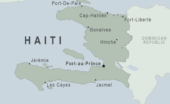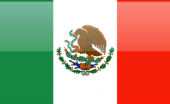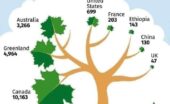Re Ian Bremmer 'Could third-party candidates upend the 2024 US election?' 3 April The current political movement in the USA…
Brazil 2016 – 18
Written by Diana Thebaud Nicholson // December 28, 2018 // Americas, Brazil // Comments Off on Brazil 2016 – 18
These 5 Facts Explain Brazil’s Crippling Scandals
(TIME) 24 July 2015
See also Brazil 2013-2015
Rio 2016 Olympics
Look at this NPR
28 December
‘The museum is alive’ – Rio team toils to rescue items from devastating fire
(The Guardian) A key moment was the rediscovery of “Luzia” – the 11,500-year old skull of “the first Brazilian woman” believed lost in the fire, then rescued in fragments from the remains of a metal cupboard. “It was a symbolic moment,” said historian Regina Dantas, 56.
Six days a week, the 60-strong recovery team picks through the ruins; their findings are taken to a screening area, examined by specialists and stored in containers.
Archaeologist Claudia Rodrigues-Carvalho, the team’s coordinator – and the museum’s former director – said that by February the building should be secure enough for proper excavation work to begin.
“I never never wanted to be here, doing this, but as it happened I can’t imagine being anywhere else,” she said.
For decades, museum directors had pleaded for more money to protect the wooden-floored museum, she said. In June, as the museum celebrated its 200th birthday, Brazil’s government development bank finally agreed to $5.6m for restoration work. But none of it had arrived when the fire broke out.
The museum’s anthropology, ethnography, palaeontology, geology, entomology, arachnology and malacology collections were all housed in the palace – and most of them were destroyed, she said. The botany, invertebrate and vertebrate collections were kept in separate annexes and survived. (See Brazil museum fire: ‘incalculable’ loss as 200-year-old Rio institution gutted)
18 December
Brazil’s biggest tribal reserve faces uncertain future under Bolsonaro
Far-right government vows to legalise mining and commercial farming on indigenous Yanomami land
Bolsonaro takes office on 1 January with promises to legalise mining and commercial farming on indigenous reserves and end the “fines party” of environment agencies. He has pledged to help the illegal artisanal gold miners called garimpeiros whose destructive work has been described by campaigners as an epidemic in the Amazon. His incoming environment minister, Ricardo Salles, whose appointment was recommended by agribusiness groups, has said he wants the “defence of the environment with the support of economic development”.
14-15 November
Brazil’s new foreign minister believes climate change is a Marxist plot
Ernesto Araújo has called climate science ‘dogma’ and bemoaned the ‘criminalisation’ of red meat, oil and heterosexual sex|
(The Guardian) His appointment, confirmed by Bolsonaro on Wednesday, is likely to send a chill through the global climate movement.
Brazil was where the international community first came together in 1992 to discuss reductions in greenhouse gas emissions. Its diplomats have played a crucial role in bridging the gap between rich and poor nations, particularly during the forging of the Paris agreement in 2015.
But when the new government takes power in January, the foreign ministry that leads that work will be headed by a man who claims climate science is merely “dogma”.
In his blog, Araújo states his goal is to “help Brazil and the world liberate themselves from globalist ideology”, which he sees as anti-Christian.
The 51-year-old diplomat – who has never served as an overseas ambassador – claims unnamed leftist politicians have hijacked environmentalism to serve as a tool for global domination.
Cuba to pull doctors out of Brazil after President-elect Bolsonaro comments
Bolsonaro demands contract changes and questions training
11,420 Cuban doctors work in poor and remote parts of Brazil
Cuba has announced it will withdraw thousands of its doctors from Brazil after the South American nation’s president-elect Jair Bolsonaro questioned their training and demanded changes to their contracts.
The far-right Bolsonaro, who takes office on 1 January, said in an interview this month that the 11,420 Cuban doctors working in poor and remote parts of Brazil could only stay if they received 100% of their pay and their families could join them.
Under the terms of the agreement with Cuba, brokered via the Pan-American Health Organization, Havana receives the bulk of the doctors’ wages.
Bolsonaro threatened to break off diplomatic relations with Havana over the program, saying it trampled on the rights of the doctors by handing the Cuban government 75% of their pay and denying mothers the right to have their children with them.
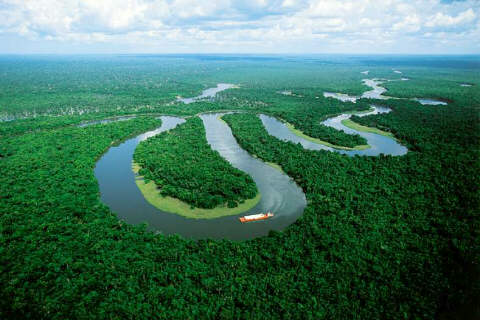 6 November
6 November
Trump’s Trade War Was Bad Enough for Brazil’s Amazon. Then Came Bolsonaro
(World Politics Review) From 2004 to 2012, the rate of deforestation in the Brazilian Amazon dropped more than 80 percent, even as Brazil’s agricultural production continued to grow. But that progress in protecting a fragile and essential ecosystem reversed in recent years, before the outlook got even worse.
First, U.S. President Donald Trump launched a trade war with China, shifting more Chinese demand for soybean products from the United States to Brazil, potentially leading to more deforestation to meet the demands of Brazilian agriculture. Then, last month Brazilians elected the far-right Jair Bolsonaro as president, a major supporter of agribusiness who has vowed to put economic growth over environmental protection. That combination could mean a surge in deforestation in the Amazon with serious implications not just for the Brazilians most directly affected, but for the wider world.
The Amazon basin is home to the world’s largest rainforest. Its trees release carbon dioxide when cut down or burned, and sequester it when planted or left in place. The pace of deforestation, especially in tropical areas like Brazil, has become a major contributor to climate change, as large in the aggregate as the European Union’s greenhouse gas emissions. Reversing those trends could reduce global emissions by even more—as much as 30 percent according to some estimates. Rainforests like the Amazon’s are also important for global biodiversity and local resilience. In addition to the ecological benefits it provides, biodiversity creates economic opportunities through eco-tourism and sources of new pharmaceutical products. Forests also contribute to localized amenities, such as clean water and protection from climate-related disasters that include flooding and mudslides, as well as drought. Reducing tropical deforestation could stem the temperature rise due to greenhouse gas emissions faster and more cost-effectively than other options, according to researchers at the Center for Global Development.
Until recently, Brazil was one of the world’s success stories in the fight against deforestation.
Brazil’s New President Openly Threatens Genocide of Indigenous Amazonians
(returntonow.net)Brazil’s new president, Jair Bolsonaro, campaigned on a plan to sell off major portions of the Amazon rainforest to agribusiness, mining. and hydro-power.
“Minorities have to adapt to the majority, or simply disappear,” he said on the campaign trail, adding that under his administration, “not one square centimeter” of Brazil will be reserved for the country’s indigenous peoples.
Thirteen percent of the land in Brazil is protected indigenous territory in the Amazon rainforest, where most of the world’s last uncontacted tribes take refuge. Bolsonaro has said he wants to put all of that land on the auction block.
Not only is this a grave attack on the human rights of Brazil’s indigenous people, but also on their ability to continue acting as the best defenders of the world’s forests,” writes Becca Warner, an environmentalism journalist for The Ecologist.
“We need all the forest we can get, to capture carbon from the atmosphere and keep it locked away,” she says. “In fact, scientists agree that halting deforestation is just as urgent as reducing emissions.”
4 November
Brazil’s Bolsonaro gives China electric shock
(Reuters Breakingviews) – Brazil’s Jair Bolsonaro threatens to short-circuit China’s energy plans. Beijing-backed energy companies hope to invest tens of billions of dollars in Brazilian power, but the president-elect has warned of Chinese intentions. Firms like State Grid would bring a lot of cash and expertise – and Brazil could use both. But populist suspicion might overrule commercial logic.
China is best known as a buyer of Brazilian commodities, but it is also an active direct investor. The country has plowed $124 billion into the Latin American nation since 2003, according to Reuters. A large chunk of that has focused on energy, with state-owned companies such as State Grid and China Three Gorges investing billions of dollars in dams and electricity transmission.
3 November
From Astronaut to Car Wash Judge, Bolsonaro Forms Brazil Cabinet
Bolsonaro is at least reconsidering his idea to create a third super ministry of agriculture and environment after the plan drew rebuke from activists, agriculture leaders and even supermodel Gisele Bundchen.
(Bloomberg) A smooth handoff will be crucial for Bolsonaro to quickly tackle his two biggest challenges — pulling the country out of its economic doldrums and cracking down on rampant crime and corruption.
Bolsonaro hopes to win both battles with two “super ministers” — Paulo Guedes, a liberal economist and financier, and Sergio Moro, the iconic Car Wash judge who helped put numerous big-name entrepreneurs and politicians behind bars, including former President Luiz Inacio Lula da Silva.
Bolsonaro hopes to win both battles with two “super ministers” — Paulo Guedes, a liberal economist and financier, and Sergio Moro, the iconic Car Wash judge who helped put numerous big-name entrepreneurs and politicians behind bars, including former President Luiz Inacio Lula da Silva.
Having big names in the cabinet is at once Bolsonaro’s strength and his Achilles’ heel.
“Now we have two ministers who can’t be fired, and by definition that’s not good,” investment bank XP’s political analysts wrote in a note to clients. “In the future the president-elect may have to deal with a political figure bigger than himself in his own government.”
Signs of clashes among his top cabinet members became apparent when Guedes defended efforts to approve an initial pension reform this year, just hours after Chief of Staff Onyx Lorenzoni, also designated as liaison with Congress, said it was better to wait for a definitive reform.
“I expected this conflict because of the shallowness of the discussion of economic issues during the campaign,” said Mauricio Santoro, professor of international relations at Rio de Janeiro’s Federal University. “This will generate some friction with Bolsonaro’s electorate, which is not economically liberal.”
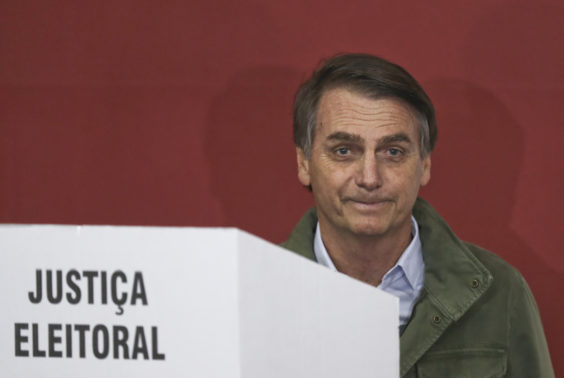
RIO DE JANEIRO, BRAZIL – OCTOBER 28: Jair Bolsonaro, far-right lawmaker and presidential candidate of the Social Liberal Party (PSL), casts his vote on October 28, 2018 in Rio de Janeiro, Brazil. (Photo by Ricardo Moraes-Pool/Getty Images)
1 November
Bolsonaro Can’t Destroy Brazilian Democracy
Brazil’s new president is a throwback to its authoritarian past—but the country is more resilient than it used to be.
By Omar G. Encarnación
(Foreign Policy) Jair Bolsonaro’s decisive victory in the second round of Brazil’s presidential elections showed a clear right-wing turn in the politics of Latin America. Three of the region’s five largest economies—Argentina, Brazil, and Chile—are now in the hands of right-wing governments. But Bolsonaro is a figure significantly more extreme than Mauricio Macri of Argentina and Sebastián Piñera of Chile, both successful businessmen who came to power preaching the virtues of small government and open markets. Bolsonaro, by contrast, is an outright reactionary and the best manifestation yet of the “Trumpification” of the Latin American right.
Displaying a Trumpian hostility toward the environment, Bolsonaro has threatened to take Brazil out of the Paris climate accord and open the Amazon to development. Last but not least is Bolsonaro’s fondness for the military and penchant for authoritarianism, which is rooted in the Latin American tradition of the caudillo, or strongman. As a former parachutist in Brazil’s last military dictatorship, in place from 1964 to 1985, Bolsonaro has heaped praise on the leaders of the dictatorship. This praise has come despite a damming 2014 truth commission report that found that the military regime was responsible for a host of human rights abuses, including having killed more than 400 individuals—many of whom were disappeared as the regime sought to cover its tracks—and having tortured many more, including future President Dilma Rousseff.
Understandably, much of the reporting about Bolsonaro’s rise in the U.S. media is predicting a dramatic upheaval in Brazilian politics with apocalyptic overtones.
Yet, for all the very serious threats that Bolsonaro poses to Brazil and the international community as a whole, it will take a lot to radically upend Brazilian politics—more so than is commonly recognized. Indeed, a compelling case can be made that Brazilian democracy, despite its youth, is more than capable of coping with the stress on the democratic system placed by the Bolsonaro presidency. Much of this is the legacy of recent left-wing administrations. They have facilitated Bolsonaro’s rise, but they also have prepared the country for him.
Despite having become a democracy only in 1985, Brazil has had a rich political experience since then. It includes having elected right-wing governments in the past, most notably in 1990, when Fernando Collor de Mello burst into office with an economic agenda that, much like Bolsonaro’s, emphasized privatizations and comprehensive state reform. Collor’s presidency imploded spectacularly; he resigned in 1992 under the threat of impeachment by Congress on corruption charges. But, more importantly, Collor’s ambitious, liberalizing economic program went nowhere. If anything, an economic agenda anchored on privatization and state reform could prove harder to implement today in Brazil than in the early 1990s.
30 October
Brazil: Bolsonaro plans threaten Amazon, say experts
(BBC) Brazil’s far-right President-elect Jair Bolsonaro will merge the ministries of agriculture and the environment, an aide says, in a move which critics say could endanger the Amazon rainforest.
What else has been been decided?
Following behind-closed-door talks on Tuesday, Mr Bolsonaro’s top economic adviser Paulo Guedes confirmed that an economic super-ministry would be formed combining finance, planning, industry and trade.
It will be headed by Mr Guedes.
Jair Bolsonaro denies he is a fascist and paints himself as a Brazilian Churchill
President-elect: ‘It’s the leftwing people … who are fascists’
Bolsonaro refuses to apologise for pro-dictatorship comments
(The Guardian) Bolsonaro told TV Band, one of Brazil’s major channels, it was his left-wing detractors who were fascists, not him.
Brazil’s far-right president-elect, Jair Bolsonaro, has reaffirmed his defense of his country’s brutal 21-year dictatorship and rejected claims that he is a fascist, instead painting himself as a Churchillian patriot determined to lead his crisis-stricken country “out of this quagmire”.
The veteran politician, who paints himself as a political outsider, also refused to say he regretted saying the military regime that ruled Brazil from 1964 until 1985 should have killed 30,000 people. In a now infamous 1999 television interview Bolsonaro also said: “You’ll never change anything in this country through voting. Nothing. Absolutely nothing.”
Bolsonaro, who has expressed admiration for dictators including Chile’s Augusto Pinochet, claimed many Brazilians now believed Brazil’s military regime “wasn’t a dictatorship as the left has always preached”.
He said the media had unjustly described Cuba’s former leader, Fidel Castro, as a president while calling João Figueiredo, who ruled Brazil during the final years of its dictatorship, a dictator.
29 October
Brazil shows us, again, that deep misogyny is no bar to running a country
(Quartz) Jair Bolsonaro, the right-wing candidate who once said in a newspaper interview that a fellow lawmaker was “too ugly” to rape, has won Brazil’s second-round presidential election.
The run-off election on Sunday (Oct. 28) took place after Bolsonaro failed to win an outright majority in polls three weeks ago, leading to the face-off against his closest rival, Fernando Haddad, of the left-wing Workers’ Party.
Bolsonaro, a former army captain of the conservative Social Liberal Party, has expressed admiration for Brazil’s past military dictatorship, and says the country needs tough leadership to deal with its problems. It’s a message that seems to have resonated with voters fed up with ever-expanding corruption scandals and violent crime (paywall)—underscored by the nearly fatal stabbing of Bolsonaro during campaigning.
On Sunday, he defeated Haddad by a margin of more than 10 percentage points, winning 55% of the vote. After his victory, Bolsonaro told supporters (link in Portuguese): “The Brazilian people understood the truth in this election.” He’ll take office in January.
Haddad responded to the defeat with this message (link in Portuguese) to supporters: “Don’t be afraid. We will be here, we will stand together.”
Christian Fascism Comes To Brazil: New President Bolsonaro Promises Christian Theocracy
9 October
Brazil’s far-right frontrunner Bolsonaro says he will rule with ‘authority not authoritarianism’
After his first round victory, Jair Bolsonaro tries to allay fears that Brazil could lurch back towards dictatorship under his command
(The Guardian) Bolsonaro – who has pledged to scrap Brazil’s environment ministry, open indigenous reserves to mining and ditch the Paris climate accord – also prevailed in the Amazon states of Roraima, Acre and Rondônia, with more than 62%, and in Mato Grosso, with 60%.
During a visit to the Amazon region in April, Bolsonaro praised Donald Trump’s approval of the Dakota Access and Keystone XL oil pipelines (“No messing around with the environment or the indigenous. Problem sorted!”) and told the Guardian he would take similar steps and target environmental groups operating in Brazil.
“This cowardly business of international NGOs like WWF and so many others from England sticking their noses into Brazil is going to end! This tomfoolery stops right here!” Bolsonaro said. “We’re in Brazil here: Great Brazil just like the Great America of our dear Trump.”
7 October
Brazil election: Jair Bolsonaro makes Trumpian pledge as poll shows big lead
Rightwinger 15 points ahead as he rallies supporters with ‘make Brazil great again’ slogan
(The Guardian) The far-right frontrunner to become the next president of Latin America’s largest democracy has vowed to make Brazil great again, as election-eve polls gave him a commanding lead in what many view as the most important election in its history.
“Let’s make Brazil Great! Let’s be proud of our homeland once again!” Jair Bolsonaro, a 63-year-old former paratrooper notorious for his hostility to black and gay people, the environment and the left, proclaimed in a Trumpian live broadcast to his seven million Facebook followers on Saturday night.
“Together we are going to change Brazil!”
5 October
Brazilian Democracy on the Brink
By Robert Muggah, co-founder and research director of Instituto Igarapé and a co-founder and principal of the SecDev Group.
(Project Syndicate) After years of corruption scandals, economic malaise, and deepening political polarization, Brazilians have lost faith in the promise of democracy, and could soon elect a dangerous authoritarian to the presidency. Before going to the polls on October 7, Brazilians should understand exactly what a vote for Jair Bolsonaro would mean for the future of their country.
Not since the restoration of democracy in 1985 has a Brazilian election been so contentious and unpredictable. At stake is the presidency, but also positions for 27 state governors, 54 senators and nearly 1,600 elected officials. Although 69% of Brazilians have faith in democracy, more than half admit they would “go along” with a non-democratic government so long as it “solved problems.” Despite efforts by a new generation of young leaders working to restore faith in democracy, Brazilians are ranked as the least trusting and most pessimistic people in Latin America today. And now, the rise of digital propaganda and fake news is making a bad situation much worse.
Among the crop of presidential candidates in this cycle, a few thrive on division, while most – including Marina Silva, the only woman in the race – advocate a middle ground. Unfortunately, the populists are ascendant, and the pragmatists have struggled to break through.
1 October
The Decline and Fall of Brazil’s Political Establishment
Whether or Not Bolsonaro Wins the Presidency, a Transformation Is Underway
(Foreign Affairs) This October, Brazilians will go to the polls to elect a new president, and the country could become the next democracy to fall in the populist wave that has been sweeping the globe. Jair Bolsonaro, a far-right nationalist member of Congress known for making racist and chauvinistic comments, is currently leading in many polls and may very well win a second-round runoff.
At first glance, it may seem strange that a country once hailed as one of the most inclusive democracies in the developing world could elect a president who has openly attacked the rights of gay people, women, and Afro-Brazilians and who has been an apologist for military dictatorship and torture. Yet Bolsonaro’s rise makes sense when one considers the backdrop of Brazil’s culture of political corruption.
7 September
Brazil presidential election thrown into chaos after front-runner stabbed
(Reuters) – Brazil’s presidential race was thrown into chaos on Friday with the far-right front-runner Jair Bolsonaro in serious but stable condition in an intensive care unit after being stabbed at a rally. … The attack further clouds Brazil’s most unpredictable election in three decades. …
Running as the law-and-order candidate, Bolsonaro has positioned himself as the anti-politician, though he has spent nearly three decades in Congress.
He has long espoused taking a radical stance on public security in Brazil, which has more homicides than any other country, according to U.N. statistics, and has openly praised Brazil’s military dictatorship, which he has said should have killed more people.
Bolsonaro has stirred controversy with comments denigrating women, gay, black and indigenous people.
3-4 September
What Was Lost in Brazil’s Devastating Museum Fire
Two hundred years of work—and millions of priceless specimens—have been destroyed in a preventable tragedy.
(The Atlantic) the museum’s ruins could be seen as a testament to neglect. The burned building was the largest natural-history museum in Latin America, but it had never been completely renovated in its 200-year history. It had long suffered from obvious infrastructure problems including leaks, termite infestations, and—crucially—no working sprinkler system. Recognizing these problems in the 1990s, museum staff began planning to move the collection into a different site, but without stable funding, those plans proceeded in fits and starts.
Brazil National Museum blaze in Rio blamed on austerity
(The Guardian) While the cause of the blaze is still under investigation, government cuts and inadequate fire protection systems have been cited as key factors. Rio’s fire chief, Roberto Robaday, said the two hydrants nearest the museum were dry, delaying efforts to douse the flames.
In recent years, the government has spent billions on the Olympics and major construction projects that generated kickbacks for politicians, but slashed spending on culture and education in the name of austerity.
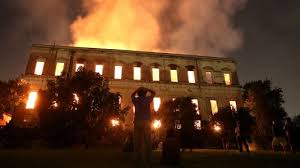 “It was a foretold tragedy”–Fire destroys Brazil’s National Museum and its prized science collections
“It was a foretold tragedy”–Fire destroys Brazil’s National Museum and its prized science collections
(Science) A fire at the National Museum of Brazil in Rio de Janeiro has destroyed one of country’s most important scientific collections. No one was injured in the fire, which broke out after the museum had closed on Sunday evening. But the blaze ravaged the museum’s massive archives and collections, numbering around 20 million items by some estimates. The museum had no sprinkler system, and only limited water was available from fire hydrants when fire fighters arrived.
In recent years budget woes had plagued the museum, and scientists had warned as early as 2004 of dangerous wiring and a lack of fire protection.
“It’s an irreparable loss, not only for Brazilian science but for the world. The building can be reconstructed, restored and everything else, but the collections can never be replaced. Two centuries of science and culture are lost forever”, said Sergio Alex Azevedo, a paleozoologist and former director at the museum.
The full extent of the damage isn’t yet clear. Some vertebrate specimens and some of the botany collection were housed in a separate building that was not affected by the fire. But millions of specimens, including the museum’s globally important invertebrate collection, were destroyed. Aerial images showed collapsed roofs, with piles of ashes and rubble inside the exterior walls that were left standing. The interior of the building was mostly wood, and safety upgrades were difficult to make because of federal rules governing historically protected sites. (The building was built in 1808 as the official residence of the Portuguese royal family in Brazil.)
The Federal University of Rio de Janeiro (UFRJ) managed the museum with funds from the federal government, and many scientists blamed chronic underfunding for the disaster. “We all knew something like this was going to happen sooner or later; it was just a matter of time,” said anthropologist Walter Neves, a retired professor at the University of Sao Paulo, who described the Luzia skull. “The museum was completely abandoned, left to rot by the disdain and carelessness of public authorities. I am in complete grief,” he said. (The Luzia skull was collected in the 1970s, but remained forgotten at the museum until Neves found it 20 years later. It was kept in a metal case, so researchers say there’s a possibility it may have survived the fire.)
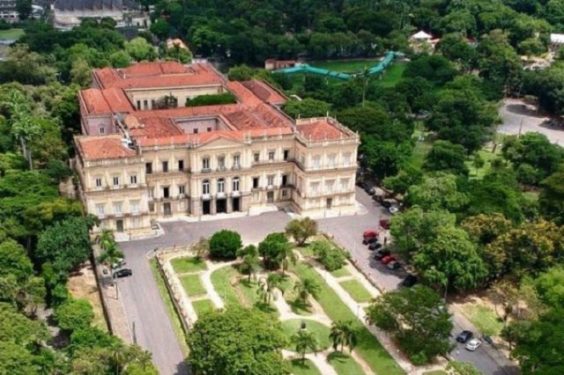
Gwynne Dyer: Bye-bye Lula
On Sunday, Brazil’s top electoral court ruled that “Lula”, former president Luiz Inácio da Silva, cannot run in the presidential election this October.
He served two terms as president (2003-2011), he dutifully waited out the following two terms, and his Workers’ Party (PT) has nominated him for the presidency again. Opinion polls give him 39 per cent support, more than twice as much as any other candidate. However, Lula is in jail in the southern city of Curitiba, serving a twelve-year sentence for corruption, and he is not getting out any time soon.
The bad news is that he is probably guilty, perhaps not of the specific offence he has already been convicted for, but of four other charges of money laundering, influence peddling and obstruction of justice that are still pending. ..there is plenty of evidence that Lula engaged in other kinds of dodgy fund-raising, not to benefit himself, but to buy the cooperation of other parties in Brazil’s congress, where there was a plethora of small parties and his PT never had a majority. This was illegal, but it was perfectly normal political practice when he became president in 2003.
That’s how Lula pushed through radical measures like the ‘bolsa familial’, a regular payment to poor Brazilians (provided that their children had an 85 percent attendance record at school and had received all their vaccinations) that lifted 35 million people out of poverty. Brazil’s economy boomed, and when he left office in 2011 with an 83% approval rating, Brazilians were both richer and more equal than ever before.
4 April
Brazil’s top court ruled that former President Luiz Inácio Lula da Silva can be sent to prison while he continues to appeal his corruption conviction.
It’s an explosive decision that appears to quash Mr. da Silva’s bid to return to power. The 72-year-old is a towering and divisive figure in his country’s politics — with a considerable lead in the polls for October’s presidential election. Mr. da Silva has called his prosecution a ploy to keep him off the ballot.
24 January
Upending Brazil’s Presidential Race, Court Upholds Ex-Leader’s Conviction
A Brazilian appeals court on Wednesday upheld a corruption conviction against former President Luiz Inácio Lula da Silva, jeopardizing his quest to win a third term in office and raising the prospect that Mr. da Silva, Brazil’s most popular politician, could be behind bars when ballots are cast in October.
The ruling was a major victory for prosecutors in what may be the highest-stakes case in the yearslong showdown between Brazil’s judiciary and the political elite. Prosecutors have portrayed Mr. da Silva, who has also been charged in six other corruption cases, as a linchpin of Brazil’s endemically corrupt political system.
2017
Accused of corruption, popularity near zero – why is Temer still Brazil’s president?
Michel Temer may escape impeachment, but the ongoing political crisis undermines democracy and opens the door to authoritarian hardliners
(The Guardian) If Brazil’s recent decline could be plotted in the falling popularity of its presidents, Michel Temer represents the bottom of the curve.In 2010, Luiz Inácio Lula da Silva ended his second term with an 80% approval rating. In March 2016 – four months before she was impeached – his protege and successor Dilma Rousseff’s administration had a 10% rating.
Last month, the government of Temer, Rousseff’s former vice-president, plunged to 3% in one poll. Among under 24-year-olds, Temer’s approval hit zero.
Temer has been charged with corruption, racketeering and obstruction of justice. Yet there have been none of the huge, anti-corruption street protests that helped drive Rousseff’s impeachment on charges of breaking budget rules. (17 October 2017)
27 June
(The Economist) Scandal in Brazil: Temer tantrum Michel Temer was charged with bribe-taking this week. It is the first such charge against a sitting Brazilian president. The administration of Mr Temer, who protests his innocence, was already the most unpopular on record. But for the case against him to proceed, the charges must be approved by two-thirds of lower-house deputies. The president is still backed by enough congressmen to make that improbable, writes our Brazil correspondent
The Corruption Charges Against Brazil’s President
Michel Temer is accused of accepting bribes, but the country’s Congress will decide if he ultimately faces trial.
(The Atlantic) The charges come a month after the release of an audio recording of a conversation between Temer and Joesley Batista, the chairman of JBS, Brazil’s largest meatpacker, in which Temer can apparently be heard approving bribes. Batista, who presented the recording to prosecutors as part of a plea deal, accused Temer of negotiating millions of dollars in illegal campaign donations for his ruling party, Brazilian Democratic Movement. Though Temer is the latest Brazilian leader to face corruption allegations, he is hardly the first. The country’s massive corruption scandal has implicated virtually every member of its political class, including dozens of lawmakers and a third of Temer’s cabinet. More than 90 people have been convicted.As I previously reported, if Temer is forced to step down, then House Speaker Rodrigo Maia, a Temer ally who is also implicated in the country’s scandal, would become president in the interim.
8 June
Brazil’s Argentina Moment
By Filipe Campante and Dani Rodrik
(Project Syndicate) Brazil’s economy has been in free fall, a casualty of years of economic mismanagement and the vast corruption scandal that has engulfed the country’s political and business establishment – and which now threatens to bring down the second president in as many years. It may seem hard to focus on policy developments amid the political and economic turmoil, but the fact remains that Brazil must overcome fundamental challenges if it is to lay the groundwork for sustainable growth. Few loom as large as the country’s fiscal woes.
29 May
The Genocide of Brazil’s Indians
Unless there is a public outcry in defense of Brazil’s indigenous people, they will continue to die — cut off from their lands, officially silenced, murdered, ravaged by malnutrition and disease — and the genocide will be complete.
(NYT Op-ed) Every week seems to bring reports of a new atrocity committed against indigenous people in some remote part of the country. But nothing seems to shock our society anymore. Not even when, a few weeks ago, a 1-year-old from the Manchineri tribe was shot in the head.
These attacks are part of a larger pattern of abuse, marginalization and neglect. Since 2007, 833 Indians have been murdered and 351 have committed suicide, according to the Special Secretariat for Indigenous Health — rates far above the national average. Among children, the mortality rate is two times higher than in the rest of the Brazilian population.
27 May
Brazil’s Crisis: How Fighting Corruption Could Imperil Political Stability
(NYT) On Wednesday, Mr. Temer deployed the military in the streets of the capital, Brasília, after thousands of protesters clashed with the police. Although the defense minister said the troops had been sent merely to “restore order,” many saw the move as a sign of profound insecurity from an already weak government.
Political science suggests this is an example of how the “islands of honesty” in corrupt systems — like independent prosecutors and courts with the willingness and authority to enforce the rule of law — can clash with networks of entrenched corruption, both provoking and spoiling efforts by political elites to protect themselves.
The politicians who pushed for Ms. Rousseff’s impeachment appear to have wrongly assumed that the powerful prosecutor’s office and judiciary would fall in line, and that a Temer government would be able to shut down or limit the corruption investigation.
That has not happened. The corruption prosecutions have continued under Mr. Temer’s presidency, and have focused on some of the most powerful people in the country.
22 May
Brazil president retreats from attempts to suspend investigation
(BBC) Brazil’s President Michel Temer has asked the Supreme Court to proceed with an investigation against him for obstruction of justice and corruption.
His lawyers say that a secret recording that appears to incriminate him has been edited 70 times.
On Saturday Mr Temer filed a petition at the Supreme Court to have the investigation suspended.
But his lawyers now say they want the investigation to go ahead to have the president’s name cleared.
How Brazil’s New Political Crisis Might Play Out: QuickTake Q&A
(Bloomberg) Brazil plunged back into crisis when the Supreme Court authorized an investigation into President Michel Temer on accusations of passive corruption and obstruction of justice. The allegations are the latest development in Operation Carwash, a sprawling corruption probe that has implicated many of the country’s business and political elite and helped bring down Temer’s predecessor, Dilma Rousseff. Temer has repeatedly denied the allegations, but several opposition legislators have called for impeachment, as has Brazil’s influential bar association, the OAB
11 May
Brazil’s ex-president Lula decries persecution as he faces corruption charges in court
Luiz Inácio Lula da Silva, the most popular president in Brazilian history, was questioned by Sérgio Moro, a national hero for jailing the rich and powerful
10 May
Brazil’s archaeologists join fight to preserve country’s ancient lands
The plan, to be debated by Congress on Wednesday, would roll back licensing rules for infrastructure projects, making it easier for construction companies to bulldoze sites of ancient Amazonian civilisations before they have been excavated.
Critics argue this is a new front in a battle for the country’s identity, since it could literally bury irreplaceable records of indigenous civilisations and reinforce the widely held but incorrect view that Brazil’s history began with settlement by Europeans.
“We draw upon the past to build our identity as a pluralist nation. This identity is now at risk, being sidelined by the image of a white and racist country,” archaeology lecturers from the Federal University of Western Pará wrote in a letter to congressmen.
Historians believe more than six million people lived in the Amazon forest before the arrival of predominantly Portuguese and Spanish explorers, gold miners and slavers, whose guns and viruses wiped out the vast majority of the native population over the following centuries.
Studies of pot fragments, black earth and contours of moats and walls suggest some of these communities were far more advanced than the later Victorian-era stereotype of “jungle savages” suggested.
[Stone age etchings found in Amazon basin as river levels fall — Drought in Brazil reveals engravings up to 7,000 years old – evidence of ancient civilisation]
23 April
Stadium deals, corruption and bribery: the questions at the heart of Brazil’s Olympic and World Cup ‘miracle’
The two mega-events were framed as a reason for Brazilians to be proud of a modern and forward-looking country; instead the economy has been shattered and a supreme court investigation keeps unearthing unsavoury allegations
Beyond the debate about the use of the stadiums, legacy and the projection of a young nation, it was the police that took centre stage as soon as athletes from all over the world left the country. Over the seven months that followed, politicians would be arrested and formally accused, while sports officials, judges and many of the venues would be the target of police operations.
What began as an investigation into the former state oil company Petrobras in 2014 soon also became a criminal process about the organisation of the two mega-events, paid for mostly with public funds and presented to citizens as a reason to be proud. The latest release of official documents by the Brazilian federal supreme court, seen by the Observer, shows that the venues were not only cathedrals of new world records but are alleged to have channelled millions of dollars worth of bribes. Brazil’s supreme court opened investigations into around 100 politicians, based on hundreds of hours of testimonies by past and present executives at the construction and chemicals conglomerate Odebrecht.

